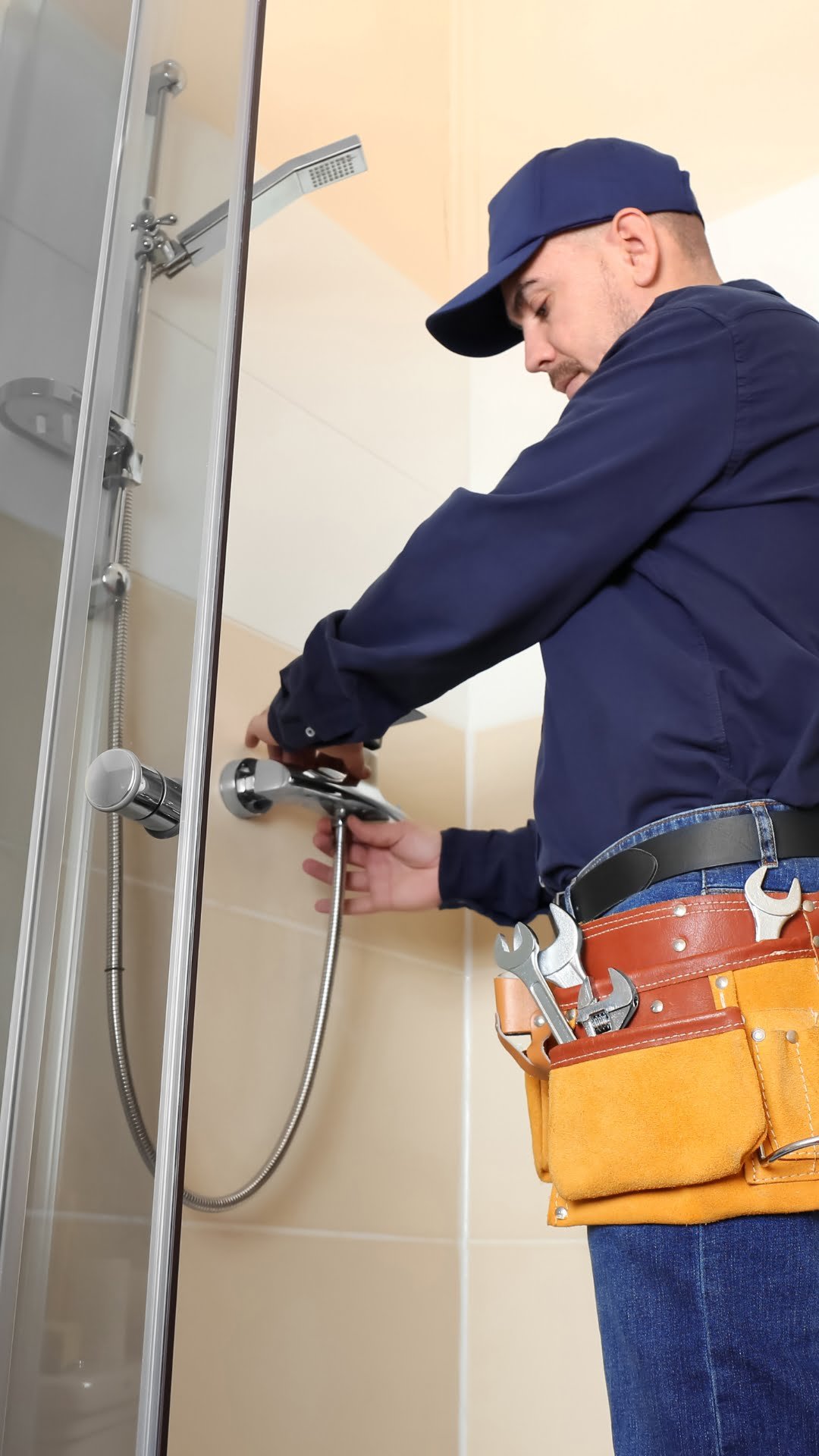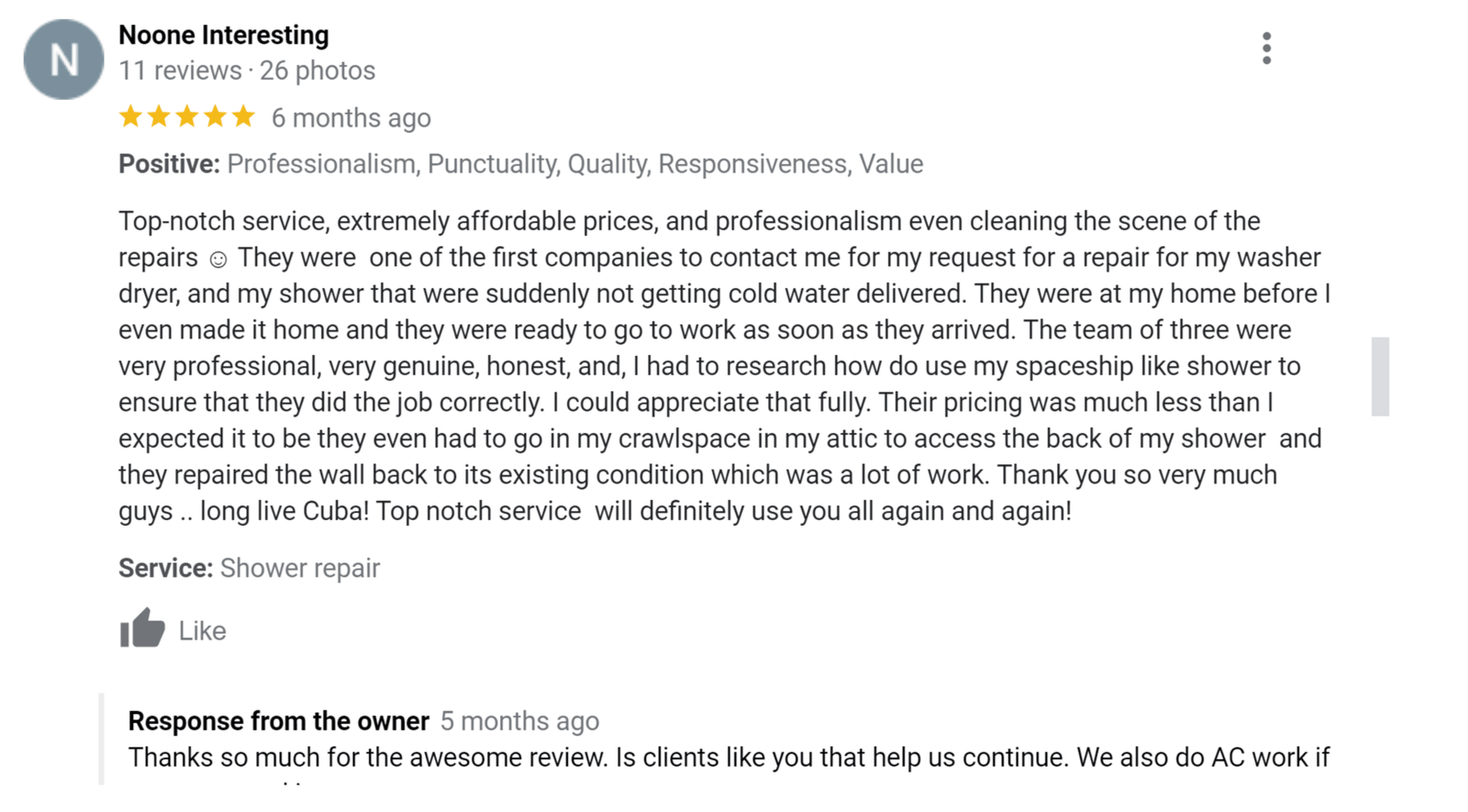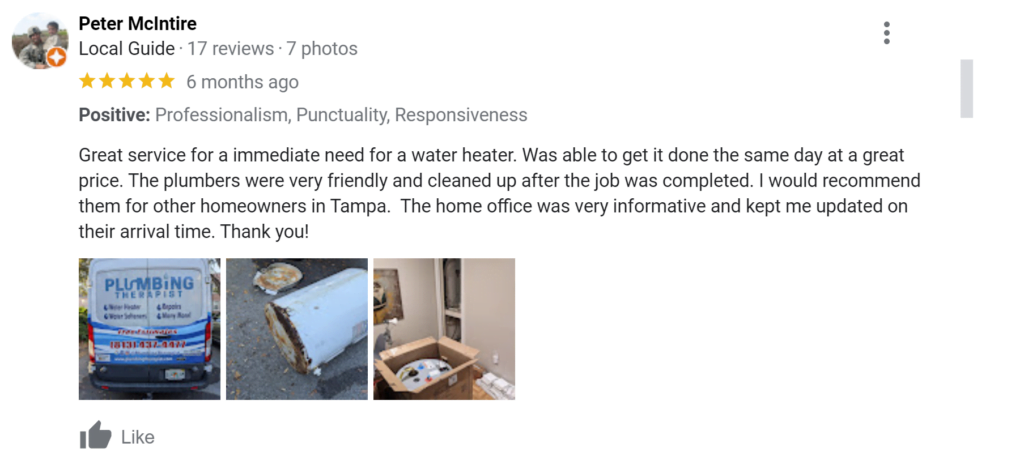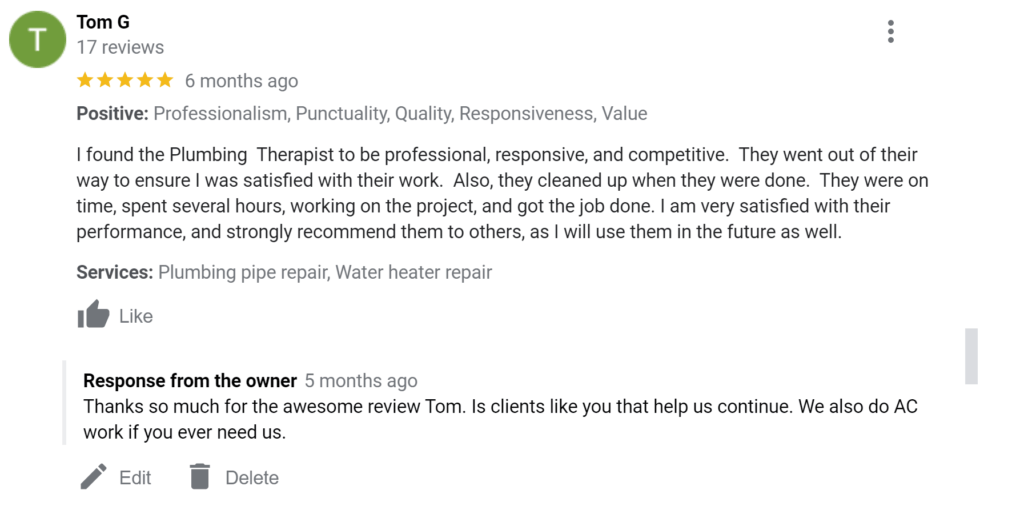Shower Repair
Prompt, reliable shower repair by Plumbing Therapist in Tampa Bay. From leaks to remodels, we ensure your shower works perfectly. Contact us!
Do You Need Our Help ?
Feel free to contact us now
$99 Water Heater Flush + Free Plumbing System Inspection
Shower Repair in Tampa Bay
Your Trusted Shower Repair Experts in Hillsborough County, Pinellas County, and Pasco County
Welcome to Plumbing Therapist, where your shower’s performance is our top priority. With years of experience serving the Tampa Bay community, we understand the importance of a fully functional and relaxing shower. Our skilled technicians are equipped to handle any shower repair needs, ensuring every service call is met with a solution.
Comprehensive Shower Repair Services
Leak Detection and Repair: Our experts use the latest technology to quickly identify and fix any leaks, preventing costly water damage and saving you money on your water bill.
Showerhead Replacement: Upgrade your shower experience with our wide selection of showerheads, including low-flow and multi-setting options for that perfect spray.
Valve and Cartridge Fixes: We handle all types of valve problems, from stiff controls to temperature inconsistencies, ensuring a safe and comfortable shower every time.
Tile and Grout Restoration: Don’t let mold or loose tiles ruin your shower’s appearance and safety. Our restoration services will bring back the sparkle and solidity to your shower space.
Full Shower Remodeling: Ready for a complete shower transformation? Our team can help design and install the shower you’ve always dreamed of, with modern features and styles.
Why Choose Plumbing Therapist?
- Prompt Service: We know that shower issues can’t wait, which is why we offer quick and efficient repair services.
- Expert Technicians: Our licensed plumbers are not only skilled but also continuously trained in the latest plumbing techniques.
- Transparent Pricing: We provide upfront estimates without any hidden fees, so you can make informed decisions.
- Quality Parts and Materials: We use only the best parts and materials to ensure lasting repairs and installations.
- Customer Satisfaction: Our job isn’t done until you’re completely satisfied with our work.
Schedule Your Shower Repair Today
Don’t let shower troubles dampen your day. Contact Plumbing Therapist for reliable and efficient shower repair services in Tampa Bay. Call us at 813-437-4477 or schedule an appointment online. Trust us to be the cure for all your plumbing needs!

Why partner with Plumbing Therapist?
Quality, Affordability, and Expertise.

No Hidden or Unexpected Charges

Free Estimates & Online Booking Available

Professionally Trained Technicians

Honesty is Guaranteed

Quick Communication & Service Within 24 Hours

400+ 5 Star Reviews

Why do I need to repair my shower?
Repairing your shower is essential for several reasons:
Water Conservation: A leaky shower can waste a significant amount of water, leading to higher utility bills and unnecessary water wastage, which is not environmentally friendly.
Cost Efficiency: Minor issues can quickly escalate into major problems if not addressed promptly, potentially leading to more expensive repairs or the need for a complete replacement.
Safety: A malfunctioning shower can pose safety risks, such as scalding water temperatures or slippery floors due to leaks.
Property Protection: Water leaks from showers can cause damage to your home’s structure, including flooring, walls, and ceilings below the bathroom, leading to costly repairs.
Hygiene and Health: A well-maintained shower helps prevent the growth of mold and mildew, which can have adverse health effects and degrade indoor air quality.
Performance and Comfort: Ensuring your shower is in good repair enhances your daily routine, providing a consistent water temperature and pressure for a more comfortable experience.
Aesthetics: A well-functioning, visually appealing shower can enhance the overall look and feel of your bathroom.
Home Value: A functional and modern shower can increase the value of your home, which is beneficial if you plan to sell in the future.
Regular maintenance and timely repairs are crucial to keeping your shower in optimal condition, ensuring it remains a safe, enjoyable, and efficient part of your home.
If you would like more information, feel free to give them a call at (813)-437-4477 or you can book online and get their latest discount!
Customer Testimonials: Real Experiences with Plumbing Therapist
We proudly share the experiences and stories of our valued clients. Their feedback provides a glimpse into the quality of service and commitment to excellence we uphold at Plumbing Therapist. You'll read firsthand how our plumbing solutions have improved comfort and efficiency in homes across Tampa Bay. These testimonials illustrate our dedication to customer satisfaction and the difference our expert services can make.




Your questions answered
Common Shower Repair Questions:
Why is my shower leaking?
A leaking shower can be caused by several issues, often related to wear and tear or improper installation. Here are some common reasons why your shower might be leaking:
Worn Out Seals or Gaskets: Over time, the seals or gaskets around your shower door, faucet handles, or between the showerhead and the pipe can deteriorate and allow water to escape.
Cracked Tiles or Grout: Cracks in the shower tiles or erosion of grout can let water seep through to the walls or floor, leading to leaks.
Faulty Plumbing Connections: If the connections between the pipes are not tight or have worn out, water may leak from these points.
Damaged Shower Tray or Tub: Any cracks or holes in the base of the shower or bathtub can lead to leaks, often noticeable as water damage on the ceiling below.
Clogged Drain: A blockage in the drain can cause water to back up and find alternative paths, potentially leading to leaks around the shower.
Malfunctioning Diverter Valve: In showers with a tub spout and showerhead, a faulty diverter valve can cause water to leak from the spout when the shower is on.
Corroded Pipes: Older pipes can corrode over time, leading to leaks. This is particularly common in homes with hard water.
Loose Showerhead or Faucet: If the showerhead or faucet is not screwed on tightly, water might leak from the connection points.
Improperly Installed Shower Fixtures: If fixtures were not installed correctly, they might not be watertight, leading to potential leaks.
Worn Out Cartridge or Washer: Inside the faucet, worn-out cartridges, washers, or O-rings can cause dripping, which may appear as a leak in the shower.
Identifying the source of the leak is crucial for determining the appropriate fix. Some issues, like replacing a showerhead washer, can be a simple DIY task, while others, such as repairing internal plumbing or fixing a damaged shower pan, typically require professional attention. If you’re unsure of the cause or how to fix it, it’s wise to call a professional plumber to avoid further damage.
How do I know if I need to repair or replace my shower?
Determining whether you need a shower repair or a complete replacement can depend on several factors. Here are some considerations to help you decide:
Age of Your Shower: If your shower is quite old and you’re facing frequent issues, it might be more cost-effective in the long run to replace it rather than pay for continuous shower repairs.
Extent of Damage: Minor issues like a leaky faucet, a clogged showerhead, or cracked tiles often require simple shower repairs. However, if you have extensive water damage, mold growth behind walls, or a cracked shower base, it might be time for a replacement.
Cost of Shower Repairs: Compare the cost of ongoing shower repairs to the one-time cost of replacement. If repairs are becoming increasingly expensive and frequent, replacement might be the better financial decision.
Effectiveness of Past Shower Repairs: If previous shower repairs haven’t held up or you’re experiencing the same problems repeatedly, it could indicate that a more comprehensive solution, like replacement, is needed.
Shower Performance: If you’re dealing with persistent issues that affect the performance of your shower, such as low water pressure or temperature fluctuations that aren’t resolved with basic shower repairs, a new shower system might be necessary.
Water Efficiency: Older showers may not be as water-efficient as newer models. If shower repairs are not improving water usage, upgrading to a modern shower could be beneficial for both the environment and your bills.
Aesthetics and Functionality: Sometimes, shower repairs can fix functional issues, but if your shower is outdated and doesn’t meet your needs or aesthetic preferences, you might opt for a replacement to modernize your bathroom.
Safety Concerns: If shower repairs are not addressing safety concerns, such as a lack of anti-scald features or structural weaknesses, then replacing your shower is essential to ensure the safety of users.
If you’re unsure whether shower repairs will suffice or if you need a full replacement, it’s best to consult with a professional. A skilled plumber can assess the condition of your shower, identify any underlying issues, and recommend the most appropriate course of action, whether that’s targeted shower repairs or a complete overhaul of your shower setup.
How long does a shower repair take?
The duration of a shower repair can vary widely depending on the complexity and nature of the issue. Here are some general guidelines:
Minor Shower Repairs: Simple shower repairs, such as replacing a showerhead, fixing a leaky faucet, or changing a washer, can often be completed within a couple of hours. These types of shower repairs are straightforward and don’t require significant alterations to plumbing.
Moderate Shower Repairs: Shower repairs that involve more complex parts, like replacing a valve or fixing a moderate leak in the plumbing behind the wall, may take half a day to a full day. These shower repairs require more work and possibly access to internal plumbing.
Extensive Shower Repairs: For more extensive shower repairs, such as correcting major water damage, replacing a damaged shower pan, or retiling, the repair process can take several days. These kinds of shower repairs are more labor-intensive and may involve curing times for materials like grout and sealant.
Shower Repairs with Custom Parts: If your shower repair requires custom-ordered parts, the repair time might be extended. The actual shower repair work might be quick, but waiting for parts can delay the overall timeline.
Shower Repairs Involving Multiple Tradespeople: Sometimes, shower repairs may involve coordination between different tradespeople, such as a plumber and a tiler. This coordination can add to the repair time.
It’s important to note that while some shower repairs can be scheduled and completed in one visit, others may require an initial assessment followed by a separate visit to complete the repair once all parts and materials are ready.
For an accurate estimate of how long a specific shower repair will take, it’s best to consult directly with a professional plumber. They can provide a more precise timeline based on the details of the shower repair needed in your particular case.
What can I do to maintain my shower and prevent future repairs?
Maintaining your shower is key to preventing future shower repairs. Regular upkeep not only extends the life of your shower but also helps avoid the inconvenience and cost of unexpected shower repairs. Here are some maintenance tips to keep your shower in top condition and minimize the need for shower repairs:
Regular Cleaning: Keep your shower clean from soap scum, mildew, and grime. This prevents corrosion and buildup that can lead to shower repairs down the line.
Sealant and Grout Maintenance: Inspect and maintain the sealant and grout in your shower. If you notice cracks or missing pieces, reseal or regrout promptly to prevent leaks that could necessitate shower repairs.
Monitor for Leaks: Watch for signs of leaks in the showerhead, faucet, and handles. Early detection can mean a simple shower repair rather than a more extensive one later.
Water Pressure Check: High water pressure can strain your plumbing and lead to shower repairs. Ensure your water pressure is set to a safe level.
Avoid Chemical Drain Cleaners: These can damage your pipes over time. Instead, use a plunger or a plumber’s snake to clear clogs, reducing the need for shower repairs due to pipe damage.
Soft Water Use: Hard water can cause mineral buildup in your pipes and on your showerhead, leading to potential shower repairs. Consider installing a water softener to extend the life of your shower components.
Showerhead Maintenance: Regularly clean and descale your showerhead to prevent clogs. This simple step can often prevent a shower repair call.
Prompt Shower Repair: If you do notice a problem, don’t delay in getting a shower repair. Small issues can quickly become big problems if left unattended.
Professional Inspections: Have a professional perform regular inspections of your shower and bathroom plumbing. They can spot potential issues before they require major shower repairs.
Use Quality Shower Parts: When parts do need to be replaced, opt for high-quality replacements. This can reduce the frequency of shower repairs due to part failures.
By following these maintenance tips, you can keep your shower running smoothly and reduce the likelihood of needing shower repairs. Regular attention means that when shower repairs are necessary, they’re often simpler and less expensive.
Is it worth upgrading fixtures during a repair?
Upgrading fixtures during a shower repair can be worth considering for several reasons:
Modern Features: New fixtures often come with improved functionality and features that can enhance your shower experience.
Efficiency: Modern shower fixtures are designed to be more water-efficient, potentially lowering your water bills and conserving water.
Aesthetics: Upgrading fixtures can refresh the look of your bathroom, adding to your home’s aesthetic appeal and potentially increasing its value.
Convenience: If you’re already undertaking a shower repair, it can be convenient to upgrade at the same time to minimize future disruptions.
Compatibility: New fixtures can sometimes be more compatible with newer plumbing, reducing the likelihood of future shower repairs.
Cost Savings: Combining fixture upgrades with a shower repair might save on labor costs compared to doing them separately.
Preventive Measure: New fixtures can prevent future issues, as older fixtures might be more prone to wear and require subsequent shower repairs.
Warranty and Longevity: New fixtures usually come with a warranty, offering peace of mind and potentially reducing future shower repair costs.
When considering an upgrade during a shower repair, weigh the immediate cost against long-term benefits. If the long-term savings and advantages outweigh the initial investment, upgrading your fixtures can be a smart move.
What is the difference between resealing and regrouting a shower?
Resealing and regrouting a shower are two different maintenance tasks that address different issues:
Resealing a Shower:
- Resealing involves applying a waterproof sealant to the joints and edges of the shower, especially around the shower tray, door, and where the walls meet the floor or bathtub.
- The sealant used is typically silicone-based, providing a flexible and mold-resistant barrier against water ingress.
- Resealing is often necessary when the old sealant has become moldy, cracked, or is peeling away, which can happen due to age, cleaning chemicals, or movement in the structure of the building.
- The process of resealing is usually quicker than regrouting and can often be done as a DIY project, although care must be taken to apply the sealant smoothly and evenly.
Regrouting a Shower:
- Regrouting involves removing the old grout from between tiles and replacing it with new grout.
- Grout is a mixture of water, cement, and sometimes sand, which fills the spaces between tiles to create a solid surface that prevents water from seeping behind the tiles.
- Over time, grout can become discolored, crack, or crumble, which may lead to leaks and water damage if not addressed.
- Regrouting is a more involved process than resealing and may require special tools to remove the old grout without damaging the tiles. It’s a more labor-intensive process and may be best handled by a professional.
Both resealing and regrouting are important for maintaining the integrity of a shower, preventing water damage, and keeping the shower looking clean and fresh. They are complementary tasks, as both the sealant and grout need to be in good condition to fully protect against leaks and moisture damage. Regular inspection and timely maintenance of both can help avoid the need for more extensive shower repairs in the future.

